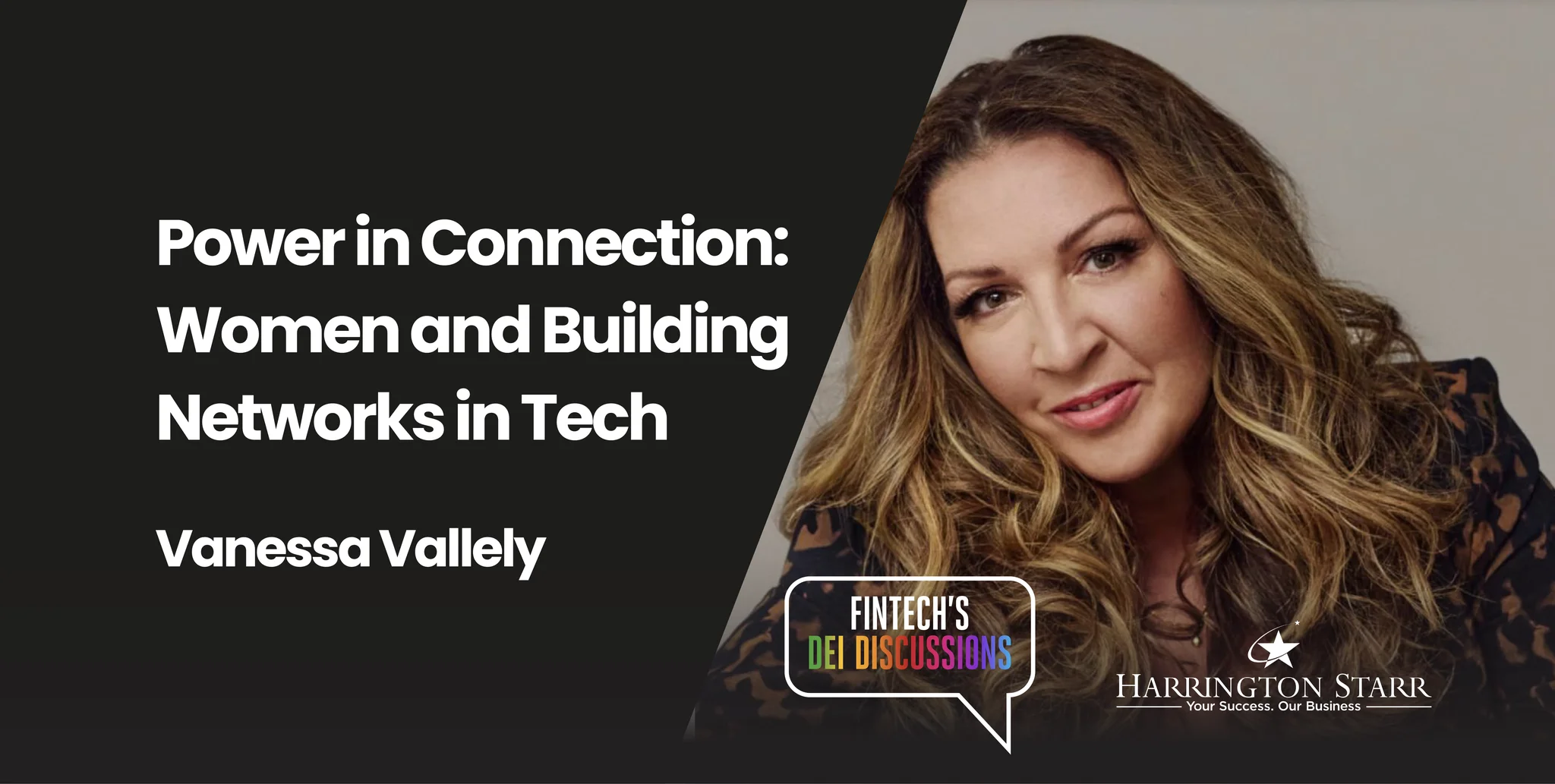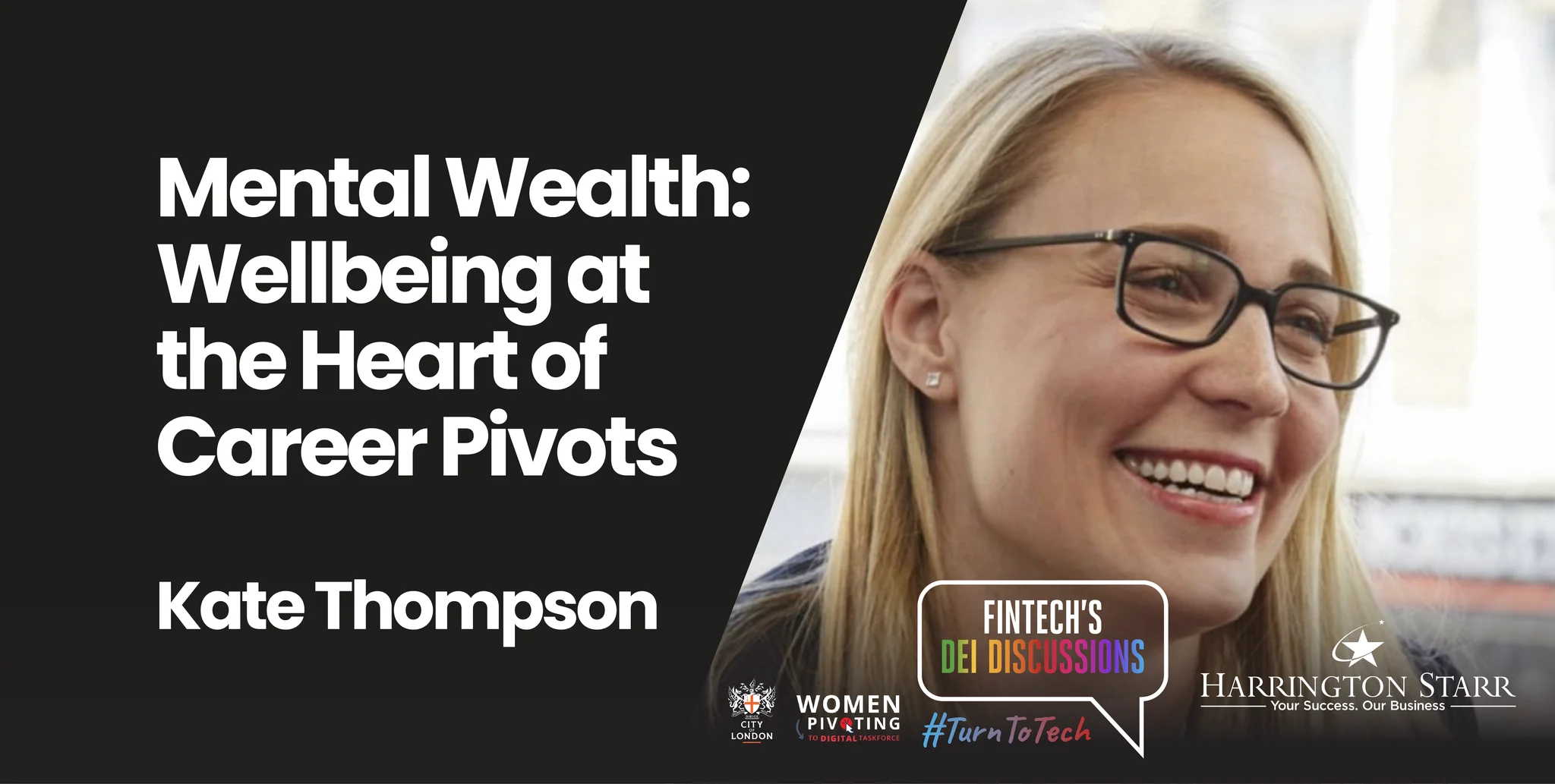
In this episode of FinTech's DEI Discussions podcast, hosted by Nadia from Harrington Starr, we delve into the evolving landscape of FinTech and the importance of diversity, equity and inclusion in leadership roles. Joining Nadia is the inspiring Asya Kuznetsova, Senior Product Manager at Wise. Asya shares her journey of navigating a male-dominated industry, discusses the challenges of breaking into leadership roles, and offers her vision for a more inclusive future in FinTech.
For businesses looking to attract top talent and build a more inclusive future, this episode is a must-listen. Harrington Starr is committed to helping fintech companies recruit diverse talent and drive meaningful change in the industry. Tune in and be part of the conversation that’s shaping the future of fintech. By featuring key voices like Asya's, we aim to provide valuable insights for businesses, leaders, and professionals in financial technology looking to drive change and growth.
From Corporate Finance to FinTech
Asya begins by outlining her early career, which started with a degree in corporate finance. Right from her university days, the gender imbalance in finance was evident. With a ratio of 5 women to every 30 men in her program, Asya quickly learned what it felt like to be one of the few women in the room—a theme that would continue throughout her FinTech career.
Her first major role was at PricewaterhouseCoopers (PwC), where she focused on corporate finance and infrastructure advisory, working on high-stakes projects such as marine ports and national railroads. During this time, Asya was often the only woman in the team, a situation she became accustomed to, but which also motivated her to push boundaries. This experience reinforced the importance of perseverance, but it also highlighted the systemic challenges women face in climbing the corporate ladder within traditionally male-dominated industries like finance and FinTech.
Asya’s move from PwC to the world of startups marked a pivotal shift in her career. She was drawn to the fast-paced, innovative environment of fintech, where she felt she could make a bigger impact. Working primarily in the U.S. market, Asya was again the only woman in a leadership role, but she thrived on the challenge and quickly developed a passion for product management. Her experience in startups allowed her to bring together her financial expertise with product innovation, helping to shape the future of FinTech solutions.
The Importance of Gender Equality in Financial Tech Leadership
A key theme throughout the episode is the persistent gender inequality in senior FinTech leadership roles, even in companies that are making a stride towards diversity. Asya shares her current experience at Wise, where mid-management levels are nearing gender parity. However, Asya notes a trend that remains the same across companies is how senior leadership roles remain predominantly male, despite a rise in diversity awareness. For Asya, the key to driving real change in FinTech is promoting more women from mid-management to senior leadership roles. Without women at the top, it’s difficult to shift the cultural and operational dynamics that influence everything from decision-making to employee retention.
Asya notes that while some progress has been made, there is still much work to be done. The FinTech industry is evolving rapidly, but gender diversity in leadership is lagging behind. In her view, companies need to be proactive in creating opportunities for women to rise to leadership positions, as this is the only way to truly foster an inclusive culture.
Shifting to EdTech: A New Perspective on Equality
One of the most transformative periods in Asya’s career came when she transitioned to EdTech, where she helped build a startup from the ground up. With a female CEO and several women in leadership roles, the company fostered a more balanced and inclusive work culture. Asya describes this experience as eye-opening, as it allowed her to see how a more gender-equal leadership team could drive better business results and create a healthier work environment.
Asya found that the company’s inclusive culture led to higher employee retention, better collaboration, and more innovation. Interestingly, this wasn’t the result of a formal DEI strategy but rather an organic outcome of having more women in leadership. This experience solidified Asya’s belief that having diverse voices in senior positions is critical to fostering a truly inclusive workplace.
The FinTech Leadership Gap: Male vs. Female Leadership Traits
A significant part of the conversation focuses on the leadership gap between men and women in FinTech. Asya explains that the progression from an individual contributor to a leadership role is one of the hardest steps in anyone’s FinTech career, and for women, it’s even more challenging. Many women, she notes, feel like they need to adopt traditionally male traits—such as assertiveness, vocal self-promotion, and a focus on personal achievements—to be seen as leaders.
However, Asya argues that this perception of leadership is outdated and limiting. Female leadership traits, such as active listening, collaboration, and giving credit to others, are often undervalued in FinTech corporate environments. Women who exhibit these traits may be seen as less confident or less capable of leading, even though these qualities can result in better team cohesion, higher employee satisfaction, and long-term business success.
Asya shares stories from her own career, as well as from her time mentoring women in product management. Many of the women she has worked with struggle with the idea that they need to change who they are to fit into a leadership role. They feel uncomfortable promoting their own accomplishments or speaking up in meetings, which can hinder their Financial Technology career progression. Asya’s message to these women is clear: You don’t need to change who you are to succeed. Instead, organisations need to evolve their understanding of what makes a great leader.
The Role of Financial Tech Companies in Driving Inclusion
Asya emphasises that companies have a crucial role to play in driving inclusion, not just by hiring more women but by creating a culture that values diverse leadership styles. She urges businesses to rethink their perceptions of what makes a strong FinTech leader and to provide more opportunities for women to rise to senior positions. Having women in leadership roles, she argues, will naturally lead to more diverse hiring and a more inclusive work environment.
She also calls on leaders—both men and women—to examine their own biases when it comes to promoting people into leadership roles. Too often, leadership qualities are judged through a narrow lens, with traits like confidence and assertiveness being prized above all else. Asya believes that by broadening the definition of leadership to include traits like empathy, collaboration and active listening, companies can create a more inclusive culture that benefits everyone.
Lessons from Mentoring Women in Product
Asya’s involvement in the Women in Product community has given her a unique perspective on the challenges women face in FinTech. Through her mentorship sessions, she has spoken with over 20 women, many of whom have expressed frustration at their inability to advance into Product leadership roles. Despite being talented and experienced, these women often feel like they are not “good enough” to lead because they don’t fit the traditional mould of a confident, assertive leader.
This sentiment is all too common, and Asya sees it as a direct result of the male-dominated leadership structures that still prevail in FinTech. Women often blame themselves for not being able to exhibit traditionally male leadership traits, when in reality, the problem lies with the outdated perceptions of what makes a good leader. By mentoring these women, Asya helps them recognise that their leadership style is valid and valuable, and she encourages them to embrace their strengths rather than trying to fit into a predefined mould.
Walking the Talk on Inclusion in FinTech
As the episode draws to a close, Nadia asks Asya what more we can all do to drive inclusion in the workplace. Asya’s answer is twofold. First, she encourages women to recognise that they are not alone in their struggles. Many women feel isolated or believe that they are the only ones finding it difficult to adopt traditional FinTech leadership traits. By talking openly about these challenges and supporting one another, women can begin to shift the narrative around what makes a successful Financial Technology leader.
Second, she urges companies to be more proactive in promoting women to senior leadership roles. Having women in FinTech senior positions is key to creating a more inclusive culture, and companies need to take concrete steps to make this happen. It’s not enough to simply have conversations about inclusion—organisations need to “walk the talk” by making real changes to their leadership structures and workplace culture.
Conclusion
This episode of FinTech’s DEI Discussions with Asya Kuznetsova, Senior Product Manager at Wise, provides valuable insights into the challenges women face in the FinTech industry, particularly when it comes to breaking into leadership roles. Hosted by Nadia from Harrington Starr, a leading FinTech recruitment business, the conversation touches on the importance of fostering diversity, equity, and inclusion in all areas of the workplace.
Asya’s journey serves as a powerful reminder that true inclusion requires systemic change, not just individual effort. By promoting more women into senior leadership roles and valuing diverse leadership styles, FinTech companies can create healthier, more innovative and more inclusive environments where everyone can thrive.
For businesses looking to attract top talent and build a more inclusive future, this episode is a must-listen. Harrington Starr is committed to helping FinTech companies recruit diverse talent and drive meaningful change in the industry.





